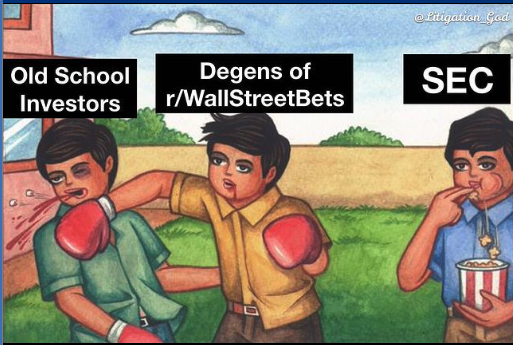
How the internet tried to get back at Wall Street by harming people the same way Wall Street does
Historically it has been the big traders with deep pockets who have bullied little traders in the markets, but the rise of retail investing has shifted the firepower. GameStop is the latest demonstration of strength by retail dollars, causing institutional short sellers to get burned and abandon their positions.
GameStop (NYSE: GME) has long been a battered stock and a broken business model. With video game purchasers finding little reason to waltz into physical stores and pay a premium for something that they can download from the comfort of their home, GameStop has had to diversify to other products, including collectibles and memorabilia. But like Blockbuster and the home video rental stores alongside it, GameStop’s brick and mortar business model was destined to fail (sorry, bag holders). Yet, despite this, GME’s graph over the past year is enough to make the Stonk’s Guy blush. This is the sort of chart that traders dream about or that you would see in a cheesy YouTube ad for turning your life around and getting rich quick.
On January 27th, 2020, a share of GameStop on the NYSE was trading at 4.28 USD. On January 26th, 2021, GameStop shares closed at 147.98 USD. The next day, shares reached 360.00 USD. The day after – you guessed it – shares hit a high of USD 468.49. What changed? One can be sure that nothing changed in the business’s fundamentals, but internet chat boards don’t seem to care. GameStop’s rally has vaulted the company’s market cap beyond 14 members of the S&P 500, including the established and profitable Marathon Oil Corp. The internet chat-boards encouraging investors to plow millions into GameStop have reached the absolute upper-echelons of meme-quality material, with famed investor Chamath Palihapitiya promising to “throw a few 100k’s at it to start” and Elon Musk tweeting “Gamestonk!!”.
Jokes aside, this is nothing to sweep under the rug. GameStop’s value has grown by the billions with no underlying business rationale for it – they still lose north of 200 million USD per year. Similar things have occurred with Hertz, AMC and BlackBerry. A $10,000 investment in Hertz the day after it filed for bankruptcy was worth around $125,000 a few weeks later. The entire premise that our securities regulatory system has been founded on is shifting. Prices are becoming detached from fundamentals as an increasing number of investors are speculating on a whim and following internet chat boards for financial advice. The disclosure requirements that add so much to the cost of capital-raising are not being used by this new breed of investors. The pumps that have caused stocks like GameStop and Hertz to fly are not based on an analysis of material information found in the company’s prospectuses or their ongoing and timely disclosure – they’re based on herd mentality and high scores on trading platforms such as Robinhood. Because of this, the comments made by Musk, Palihapitiya, Alexandria Ocasio-Cortez and many other leaders are extremely disappointing. Instead of cautioning bullish traders, they poured gasoline on a fire for the simple sake of making cheap political jabs.
The rise of retail investing platforms, the game-fying of investing/speculation, and the herd mentality of modern retail investors is not something that can be ignored by regulators and lawmakers any longer. What are effectively pump-and-dump schemes are going completely unregulated in some of America’s most well-known companies. Those who buy-in at the top of these prices are going to lose it all, and you can be sure that this is bound to happen. While there are many benefits to the increasing power and control gained by retail investors, such as the democratization of our capital markets, the law needs to keep up, because the reasonable investor sure hasn’t.
UPDATE: Since originally writing this story the news coverage has blown the matter up to anything beyond what wallstreetbets expected, including myself. There are many perspectives on the matter, including that this is a “movement” and a “revolution” against Wall Street. I certainly believe change is needed both on Wall Street and in Bay Street’s world of finance – my many past articles in this paper evidence that. But many have lost sight of the dangerousness that this has snowballed into. My personal view is that the rise in GME stock price was and is a pump and dump scheme, only now the perpetrators can hide behind the guise of “fixing Wall Street”. It is a view that has arisen by my participation on wallstreetbets long before this was a story. Before this reached international news outlets the narrative on Redditt was not “lets fix Wall Street” or “get back at them” – it was simply “let’s make some easy money”. What has transpired is dangerous, and novice investors investing on the basis of headlines should stay away from the ordeal. The majority of wealth redistribution from this scheme will not flow from Wall Street to Main Street, but from late-coming retail investors to a small group of Redditors. Others and I have written in this very paper about the very need to carefully balance the rights of retail investors with the need for stable and productive capital markets. The story behind GME is a culmination of these issues, though it arrived much quicker than I could have imagined.
